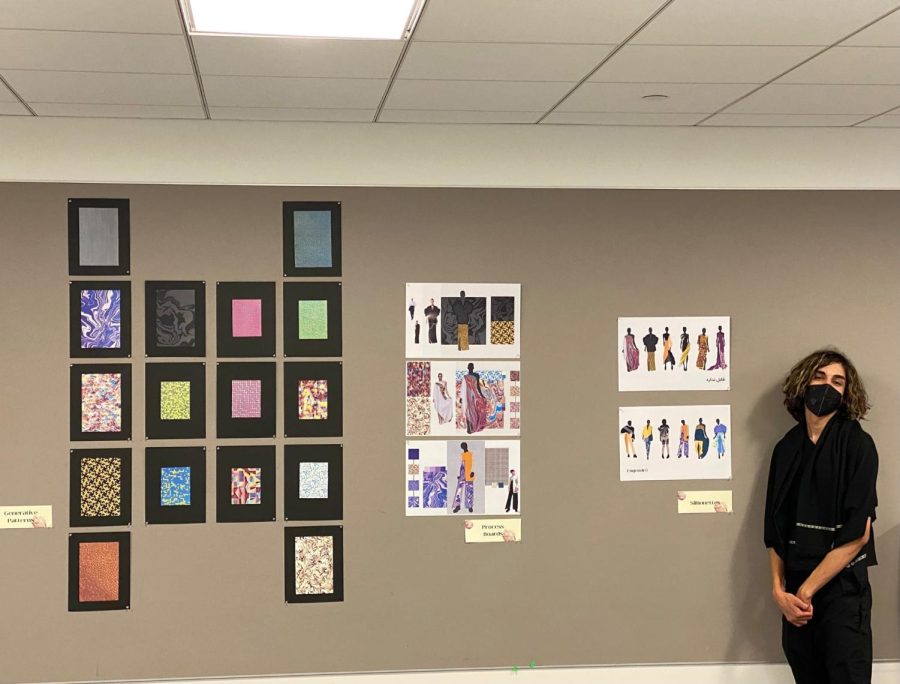‘Liberatory fashion’: Student-run fashion brand Naranji aims to set people free through clothing
Photo courtesy of Sahibzada Mayed
At Naranji, student fashion designer Sahibzada Mayed uses creative coding and digital illustration to design colorful custom-tailored pieces.
May 12, 2022
Soft lavenders, deep violets and rich magentas swirl together on a computer screen, creating a psychedelic pattern. Combining creative coding and digital illustration, McCormick junior Sahibzada Mayed experiments with design patterns for upcoming fashion brand Naranji.
Naranji aims to redefine the future of fashion and technology, disrupt the gender binary and reclaim cultural fashion, according to the start-up’s Instagram.
“The brand is focused on people, and I try to center that as much as possible. Who’s wearing these (clothes)? What’s their experience?” said Mayed, Naranji’s founder. “I want to give that impression that fashion is for everyone.”
During the winter, Mayed worked on his engineering capstone project, which centered around fashion and its roots in colonialism. Although they were always interested in fashion, Mayed said the project helped lay the groundwork for starting the brand.
Coming from an engineering background, Mayed said he sees how technology and fashion design can intersect. For Naranji, Mayed uses generative art, a design process that uses code to create computer-generated patterns.
“(Generative art) is helping me expand creative possibilities,” Mayed said. “I may not have come up with these color combinations had I not seen them. I may not have come up with these patterns had I not coded them.”
Although the computer helps inform the design process, the computer isn’t the designer — Mayed is. They said designing involves many iterations, and they often manipulate the computer-generated patterns to create the final result.
McCormick junior Jazmyn Lu models for Naranji. She said watching Mayed take engineering in an artistic direction is exciting.
“Coding has (is thought) to be like, ‘You’re just going to plot things or you’re going to simulate this,’” Lu said. “It’s not … very creative, so I think it’s cool that (Mayed) is adding creativity.”
Mayed said fashion has been traditionally Euro-centric. Growing up in Pakistan, he said he noticed a cultural desirability surrounding whiteness.
Mayed said Naranji takes inspiration from ‘liberatory fashion,’ which uses design to set people free from intersecting forms of oppression and marginalization.They said Naranji seeks to empower individuals to embrace their identities, helping them break free from these Euro-centric norms.
“I’ve thought deeply and critically about skin color and beauty standards … That’s integral to my understanding of who has fashion and what is fashion,” he said. “Those are important frameworks I focused on, because historically, there’s been a disconnect.”
Mayed said Naranji also aims to disrupt fashion labels’ size and gender expectations. As an ethically-sourced and zero-inventory brand, Naranji works with a Montreal manufacturer to create made-to-order garments.
In Pakistan, Mayed’s mother ran a fashion boutique, which exposed Mayed to custom tailoring. He said custom-tailored clothing is made to the customer’s size, which makes them feel their best.
In their first two collections, Mayed said they were drawn to fluidity. Naranji seeks to design genderful clothing to affirm peoples’ diverse gender representations, he said.
“The goal is to think about how people’s gender identities intersect,” Mayed said. “You cannot put people into this gender binary … There’s no good way I can put labels on gender representation, because (gender) is so fluid.”
Mayed said in the future, the brand hopes to incorporate co-designing, so more voices are involved in the design process. If a customer likes a pattern, the brand plans to collaborate with them to customize patterns, colors and silhouettes, they said.
Medill freshman and Naranji Social Media Director Ysa Quiballo said the Naranji team works together to form the brand’s vision. Ultimately, Naranji’s message stems deeper than expressing individuality, Quiballo said.
“(Naranji is) about breaking barriers for people and providing an avenue for people to create change in their own lives and the lives of other people,” Quiballo said.
Email: [email protected]
Twitter: @JessicaMa2025
Related Stories:
— ‘A Recycled Show’: Sustainable Evanston hosts fashion show promoting sustainability, mutual aid
— Artist and shop owner Barbara Ruiz talks upcycling, sustainability in fashion
— The Ready Generation advocates for justice, equality through fashion












